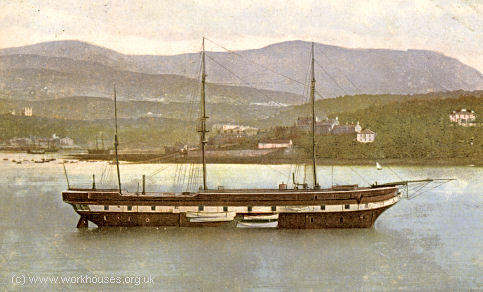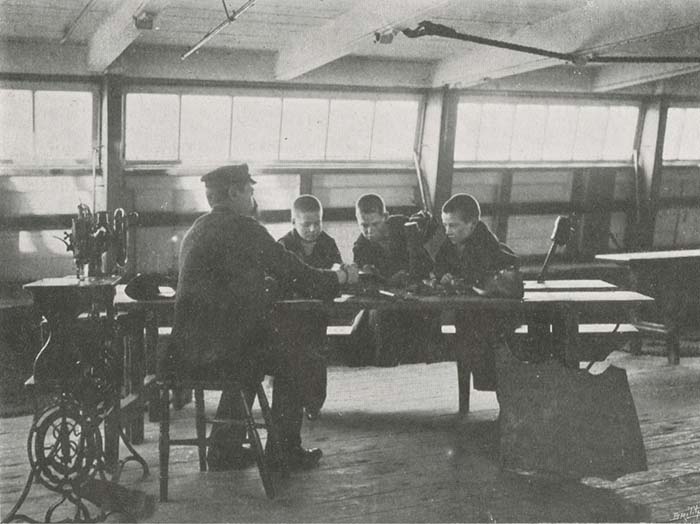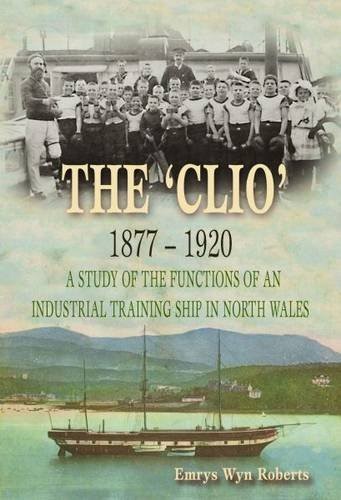
The tiny pot-bellied orphan John ’Warrington’ may have found his short stay in Denbigh a welcome respite from the Clio, where he had been sent by the Warrington Poor Law Guardians to prepare for a life at sea.

Photo courtesy of Gwynedd Record Office Caernarfon
The Clio had been towed to the Straits in 1877 and, for the next 40 years, provided care and training for homeless, destitute and poor respectable boys aged 12 to 16. Discipline aboard ships like the Clio was strict and the birch used to enforce it. From his asylum case notes it appears that John was a boy who frequently required corporal punishment. Sleeping arrangements provided their own punishment. The boys slept in hammocks which must have been icy-cold in winter, despite the provision of flannel drawers, and the Clio’s 1879 Annual Report records several cases of frostbite during the previous winter and that “one poor little fellow lost some of his toes”.[1]
The ship had room for around 260 boys but by 1879 only 10 had been brought from North West Wales and at least 70 per cent of the boys came from Poor Law authorities in London, Liverpool and Manchester.
The Captain Superintendent’s Report of 1879 notes the need for an agent to be appointed in Liverpool “to dispose of the boys when Trained, as there are no means of disposing of them at Bangor”[2] It would be this officer’s job to obtain situations for boys going to sea and to take charge of them before they joined their ships and between voyages.
The Admiralty provided a grant for boys who left the Clio to join the Navy but the ship was largely financed through fees paid by Poor Law Unions and School Boards for the paupers they found difficult to contain in workhouses. Few of these boys had stable families and, like John “Warrington”, many were orphans or motherless or fatherless. In 1879 only 5 boys were presented for training by their parents.
A typical day aboard the Clio began at 5 am. After washing themselves, the boys had to scrub the decks before a breakfast of oatmeal and milk. After breakfast there would be “simple family worship and Bible reading” followed by lessons in “reading, spelling, ciphering, vocal music, history, geography, drawing and religious instruction”.[3] Dinner was served at noon – usually meat and potatoes – and then after a recreation period there were lessons in seamanship. One very important lesson in seamanship – learning to swim – was catered for on the Clio by the installation in 1879 of a “swimming bath”.
Boys of all religious denominations were accepted and any not already baptised were baptised and later confirmed at Bangor Cathedral, the Bishop of Bangor being an active member of the Society’s committee.

Expenditure on the training ship inevitably increased and there were regular appeals to the public for assistance. A special fund was set up to raise money for improvements to the sick bay, the tailor’s shop, the carpenter’s shop and the drying room. Another fund was set up to provide boys with outfits on leaving the ship and in 1879 the executors of Mr. Griffith of Caerhun, near Bangor, were warmly thanked by the Committee for a generous donation of £500. Useful savings were made by making, repairing and laundering the boys’ clothes and boots on board.
Clio’s Tailor Shop –Photo courtesy of Gwynedd Museum Bangor
“The Tailoring and Shoemaking accounts show
good results, and a great saving of expense has
been affected. 459 Serge Frocks, 458 pairs of Serge
Trousers, 262 Flannels, 534 pairs of Drawers, 73
Canvas Suits, 103 Check Shirts, 70 Bed Sackings,
152 pairs of Boots, and several miscellaneous
garments have been made at a cost of £300. These
things if made on shore would have cost at least
£500: and some hundreds of garments have been
repaired, as also have 392 pairs of Boots and 800
Bed Sackings at a cost of £59. These if repaired on
shore would have cost at least £150. 37,000 pieces
have been washed at a cost of £18.”[4]
The boys were simultaneously given the chance to learn skills apart from seamanship. John ‘Warrington’ told the Medical Superintendent at Denbigh that he could sew and he may well have worked in the tailor’s shop on the Clio. Although possibly not very hard. His Denbigh case notes record that:
“He soon became tired of sitting all day on the Tailor’s bench and have sent him out on the farm where is so far equally useless!” [5]
Records suggest that while some boys were unable to tolerate shipboard life because of ill health or a hardened resistance to any form of discipline there were other boys who relished it. Enoch Williams of Llandudno was sent to the Clio in 1887 at the age of 12 for stealing washing from a clothes line but, after leaving the ship, was valued by employers as a very reliable man who always wore a naval sweater and a peaked sailor’s cap even when he was working ashore.[6] And whatever concerns local residents may have had about the ‘naughty boys’, 298 Clio lads marched at the proclamation of the Bangor Eisteddfod in 1890.[7]

Any boy who could cope with the stern routine, regular beatings and endemic bullying might have found some things about the Clio to like. The ship was proud of its brass band and the 1879 report notes that: “The Band has made real progress since the appointment of Mr. Jackson as Musical Instructor and the Boys now sing remarkably well.” On special occasions the band put on public concerts like the one below and sometimes on a Sunday Bangor residents willing to donate a shilling were welcomed aboard the Clio for a religious service followed by afternoon tea and a concert performed by the boys.
When war broke out in September 1914 naval recruitment became a priority and the Clio boys were set to making kit bags and ammunition pouches. Forty four boys joined the Navy and another 163 joined the Army. After the war, the Clio lay neglected in the Straits until in March 1920 she was towed away and scrapped.
Another training ship with connections to North West Wales, the Indefatigable, had a longer history. Moored on the Mersey at Birkenhead, the ship was loaned by the Admiralty to provide naval training for the “sons and orphans of sailors who are without means, preference being given to those whose fathers had been connected with the Port of Liverpool”. The original ship became unfit for use in 1912 and was replaced by another vessel until 1941. But then the establishment was forced onto land by the war and after a few years in temporary accommodation, it became based at Plas Llanfair on Anglesey where it remained until quite recently.
Further Reading: Local historian Emrys Rhys Roberts has written a comprehensive history of the Clio.

Footnotes
[1] Third Annual Report of the Society of the Industrial Training Ship ‘Clio’, 1879.
[2] Ibid.
[3] Ibid.
[4] Ibid.
[5] DRO/HD/1/366/Case no. 503
[6] C Draper (2005), Paupers, Bastards and Lunatics: The Story of Conwy Workhouse, Gwasg Carreg Gwalch
[7] North Wales Chronicle, January 25th 1890.
